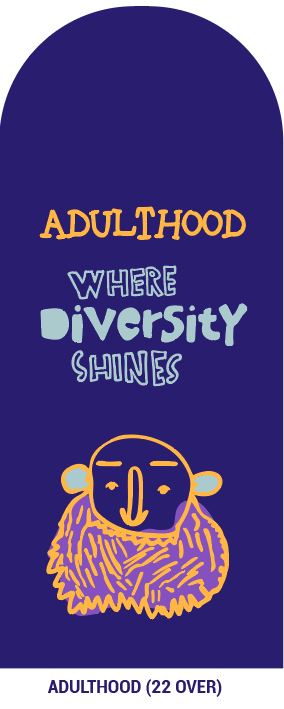
Adulthood (19 years and beyond):
Time for Achievement and Responsibility.
Full adulthood begins around 19 years old and extends over several decades as individuals develop and consolidate their independence, life plans, and contributions to society. People with autism face unique challenges in areas such as employment, relationships, and independent living as they transition to adulthood. However, with appropriate support and a positive approach, individuals within the autism spectrum can thrive and lead fulfilling lives beyond the age of 19.
While the transition to adulthood presents challenges, it also opens new doors for individuals with autism to explore their talents, connect with others, and find their purpose. Far from being a story of limitations, adulthood offers opportunities for growth.
People with autism may struggle with navigating the job search process, interviews, and social dynamics in the workplace. Their strengths, such as attention to detail and focus on repetitive tasks, are often underutilized. However, in an inclusive work environment, adults with autism have much to offer with their systematic thinking, dedication, and specialized skills. Identifying these strengths and finding a compatible career allows them to fulfill their potential. Many companies actively seek to diversify their workforce by hiring adults with autism.
Relationships with others can be challenging but not impossible. With patience, open communication, and an open mind, friendships can be cultivated. Romantic relationships also become possible, enriching the human experience of autism.
Independence, with the right personalized support, allows individuals with autism to live on their own and manage daily responsibilities. Technology, therapies, and trained support workers enable the creation of an accessible home.
Adulthood with autism has its challenges but approaching it with a positive mindset and a focus on possibilities makes a significant difference. Each person with autism has a lot to offer; they just need opportunities to shine.
Here, we provide a community that wants to share experiences, information, data, etc., to make this stage more rewarding and successful for everyone.

ARTICLES

Financial Independence for Adults with Autism A Detailed Look at Supplemental Security Income (SSI)
The world of financial support can be daunting, especially for some adults with autism. Supplemental Security Income (SSI) is a resource that provides necessary financial assistance to many adults on the autism spectrum. This publication aims to demystify access to SSI benefits, offering guidance for adults with autism and their caregivers. From understanding eligibility criteria to successfully applying, we delve into aspects that can help foster independence and improve the quality of life for neurodiverse adults.

The Role of Inclusive Education in Supporting People with Asperger’s Syndrome
La educación inclusiva desempeña un papel fundamental en la integración y apoyo a personas con síndrome de Asperger. Su objetivo principal es desarrollar el potencial de todos los estudiantes, sin importar sus características personales, asegurando así la igualdad de oportunidades y la eliminación de barreras en el sistema educativo. Asperger para Asperger se presenta como un recurso confiable y profesional para brindar apoyo a personas con síndrome de Asperger, contribuyendo a su éxito académico y social.

The Best Version Of Me
I am an autistic adult who lived undiagnosed through the sixties and seventies in a school environment where differences were not accepted and teachers thought quiet, bright, students could be left alone in favor of the more vocal, struggling ones. I fell through the cracks and landed in a no-man’s land of bullying, rejection, sensory assaults, and pervasive loneliness.

“Inclusion of People with Disabilities, A Story of Sheep and Wolves”
I still have the same question: Why are people with disabilities denied in recruitment processes by companies in Mexico?
In countries like Spain, there are laws where each company must have at least 2% of its employees with some kind of disability, and if they do not comply, there are no other options. Countries like Mexico barely require 1% by “law” of people hired with some disability. In companies like Bimbo or Coca Cola, which have over seventy and ninety thousand employees, 1% is barely seven hundred employees with disabilities.

CozyHeadphones Review 2024
Finding the perfect headphones for autism can be a daunting task, especially for children with sensory sensitivities. Many children with autism struggle with traditional headphones due to discomfort, poor fit, and overwhelming sound levels. CozyHeadphones might be the solution you’ve been looking for.

How to Choose the Best School for Your Autistic Child? Key Tips
Choosing the best school for your autistic child is a complex decision that directly impacts their development and overall trajectory. In the United States, there are several options available. It is crucial to find one that meets your child’s unique needs and fosters a supportive and inclusive environment.

